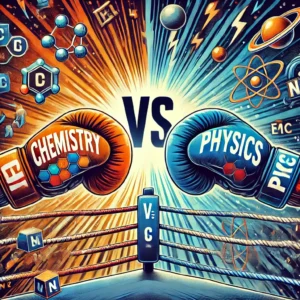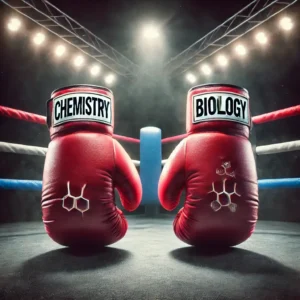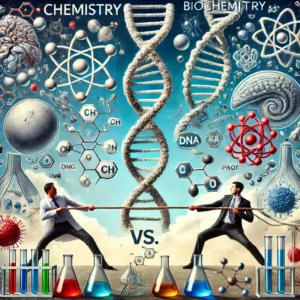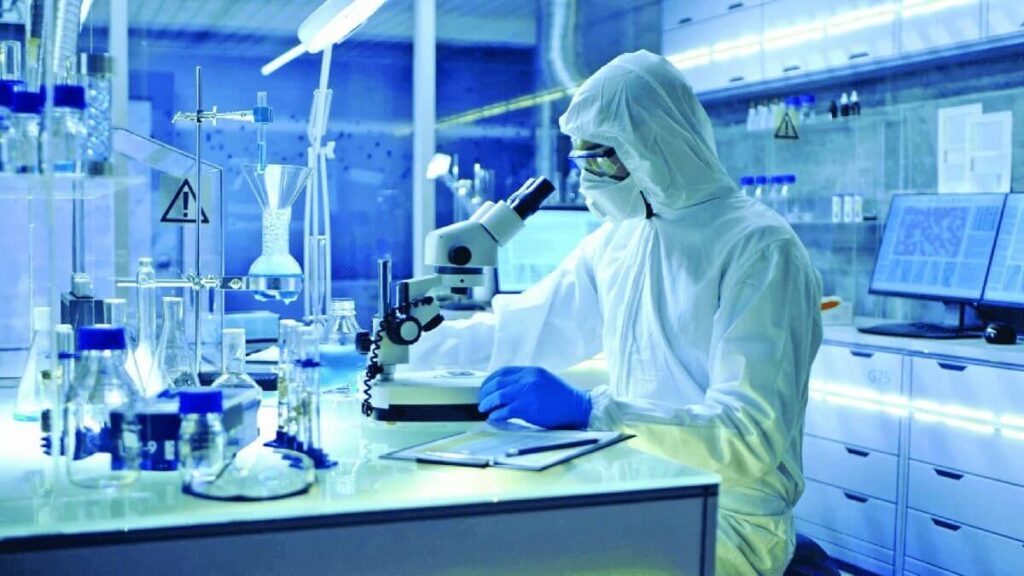Generally, we study science to better understand our environment and the world around us. All our knowledge about our planet, including how our bodies function, the food we eat, the reproduction of plants and animals, how smartphones and computers work, and the products made in factories among other things, is derived from science.
In schools across the globe, science is divided into 3 classical subjects or fields: Biology, chemistry, and physics.
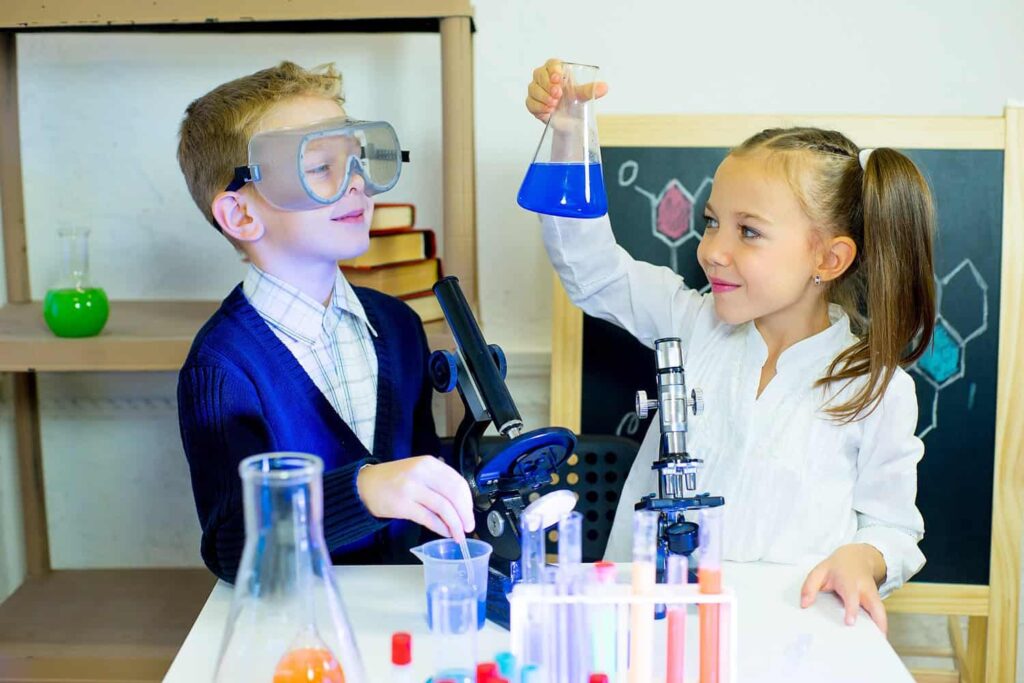
What Is Chemistry About?
In the course of our daily lives, we encounter or use different substances. These substances are in the form of what’s commonly referred to as matter. Anything you can see or touch around you—soil, rocks, air, water, plants, animals—is made of matter. So, matter is basically everything that makes up our universe.
The study of chemistry involves carrying out experiments on matter, making observations, doing analysis, interpreting the findings, and making conclusions.
You might be wondering, why are the experiments conducted? Well, chemists, or scientists who study chemistry, conduct experiments on matter (or substances) to discover:
• The composition of matter or chemical substances that make up a particular object.
• How the chemicals in the substances (or matter) behave under different conditions.
• How different substances in a particular object interact.
• How different substances in a particular object can be separated.
The information obtained from these aspects helps chemists understand how some substances can be altered to make them more useful to humans or to explain why they behave as they do.
So we can define chemistry as:
Chemistry is the study of the structure, property, and composition of matter as well as the changes that matter undergoes.
10 Other Definitions of Chemistry
As you study, you will come across different definitions of chemistry, which may not be the same as the one given above. This doesn’t mean those definitions are wrong. It simply shows that chemistry is a broad subject that connects with many other fields.
Chemistry has different branches, like organic, inorganic, physical, analytical, and biochemistry, each with its own focus. It also overlaps with subjects like physics, biology, medicine, environmental science, and engineering, so different areas may define it in their own way. Experts such as chemists, teachers, doctors, and industry professionals also describe chemistry based on their work.
To help you understand and prepare for the different definitions of chemistry, here are some more ways people define chemistry:
1. Classical Definition
Chemistry is the science of substances, their properties, how they interact, and how they change to form new substances.
This definition dates back to early chemistry when scientists focused on observing and describing chemical reactions without fully understanding atomic structures. It includes studying how elements combine to form compounds, how substances change in different conditions (such as heating or mixing), and how chemical reactions produce new materials with different properties. This view of chemistry laid the foundation for modern chemical theories and laboratory practices.
2. Modern Definition
Chemistry is the study of atoms, molecules, and their interactions, leading to the formation of different materials and energy transformations.
Unlike the classical definition, modern chemistry is deeply rooted in atomic and molecular theory, explaining how matter behaves at a microscopic level. It explores chemical bonding, reaction mechanisms, and the role of energy in chemical changes, such as the heat released in combustion or the energy stored in chemical bonds. Advances in quantum mechanics, nanotechnology, and synthetic materials have further expanded this definition, allowing scientists to design new substances and understand complex biological and industrial processes.
3. Analytical Chemistry Definition
Chemistry is the study of the composition of matter and the methods used to identify and measure its components.
Analytical chemistry focuses on techniques such as spectroscopy, chromatography, and titration to determine what substances are made of and in what quantities. It plays a crucial role in many fields, including medicine (blood tests, drug purity analysis), environmental science (pollution monitoring), and food safety (checking for contaminants). Analytical chemistry is essential for quality control in industries, forensic investigations, and scientific research, ensuring accurate measurements and reliable data.
4. Physical Chemistry Definition
Chemistry deals with how matter behaves at a molecular and atomic level and how chemical reactions occur.
Explanation: The definition of physical chemistry highlights that this branch of chemistry investigates the underlying principles and behaviors of matter at a very small scale—atoms and molecules. The reason behind this focus is that matter’s properties and behaviors, such as how substances react or how energy is exchanged during a reaction, are best understood by examining the forces and interactions at the microscopic level. Physical chemistry combines concepts from both chemistry and physics to explain the ‘why’ and ‘how’ behind chemical reactions, such as why some reactions are fast, while others are slow, or how molecules move and interact during reactions. This understanding allows for the design of new materials and improves processes in fields like energy, materials science, and industrial chemistry.
5. Biochemistry Definition
Chemistry is the study of chemical processes in living organisms.
Biochemistry focuses on understanding the chemical reactions and structures that are vital to the functions of living organisms. It examines how molecules such as proteins, lipids, carbohydrates, and nucleic acids interact to perform essential life processes like metabolism, energy production, and genetic information storage. The reason for defining chemistry in this way is that life itself is based on complex biochemical reactions, and understanding these reactions at the molecular level is key to fields like medicine, genetics, and biotechnology.
6. Environmental Chemistry Definition
Chemistry is the study of chemical processes in the environment and their effects on ecosystems.
Environmental chemistry focuses on the interactions of chemicals in natural systems—air, water, soil, and organisms—and how these processes impact ecosystems. The reason behind this definition of chemistry is the fact that human activities and natural events release chemicals into the environment that can affect the health of ecosystems, biodiversity, and even the climate. By studying these chemical processes, scientists can understand the causes of environmental problems like pollution, acid rain, and climate change. It also helps in finding solutions to mitigate environmental damage, such as by developing eco-friendly materials, monitoring pollutants, and improving waste management.
7. Philosophical Definition
Chemistry is the study of matter and its transformation, bridging physics and biology in understanding the natural world.
The philosophical definition of chemistry emphasizes its role in understanding the fundamental nature of matter and the processes that govern its changes. This view sees chemistry as a way to explore not just individual substances but also how these substances relate to each other and to the broader universe. The reason behind defining chemistry this way is that it highlights the connections between various scientific fields—chemistry links the physical world, studied by physics, with the biological processes studied in biology. For example, chemistry helps explain the physical laws that govern chemical reactions (from physics) and how these reactions occur in living organisms (from biology). By bridging these areas, chemistry plays a central role in our understanding of everything from the microscopic behavior of atoms to the complex processes of life. This perspective reflects the deep interconnections that underlie all natural phenomena.
8. Educational Definition
Chemistry is the science that explains the properties of substances and how they interact, often studied through experiments.
The educational definition of chemistry focuses on its role as a field of study, particularly in schools and universities. This definition highlights that chemistry is about learning how different substances behave—how their properties (such as color, density, and reactivity) define their interactions with other substances. The reason for this definition is that chemistry is taught with an emphasis on experimentation, as hands-on experiments allow students to observe and understand how substances react under different conditions. Through these experiments, students learn to predict outcomes, test hypotheses, and deepen their understanding of scientific concepts. The educational perspective of chemistry makes it accessible and practical, offering students a way to explore the natural world by directly interacting with it. This approach ensures that the subject is not only theoretical but also something that can be actively experienced and understood through observation and practice.
9. Matter and Energy Interactions Definition
Chemistry is the study of how matter interacts with other matter and how these interactions involve changes in energy.
This definition focuses on the core of chemical processes—how different forms of matter react with one another and how these reactions are accompanied by changes in energy. When matter interacts, whether through chemical reactions or physical changes, energy is either absorbed or released. This could be in the form of heat, light, or even sound. For instance, when fuel burns, energy is released in the form of heat and light. Similarly, in processes like photosynthesis, energy is absorbed from light and converted into chemical energy. By studying these interactions, chemistry helps us understand the behaviors and transformations of matter, while also providing insights into how energy is managed and transferred during these processes. This definition highlights the dynamic relationship between matter and energy, which is fundamental to understanding a wide range of phenomena, from combustion to biological reactions.
10. Fundamental Properties of Matter
Chemistry is the study of the fundamental properties of matter and the various ways they react or combine with other matter, or the scientific study of how these substances interact with each other.
This definition highlights chemistry’s focus on understanding the basic characteristics of matter, such as its physical and chemical properties, and how these properties influence its behavior in reactions or when combined with other substances. Chemistry investigates how materials change under different conditions—whether they react to form new substances, combine to create compounds, or interact in other ways. So, chemistry provides valuable insights into how materials work and how they can be used in everyday life, from industrial processes to biological systems. This approach forms the foundation of understanding both the nature of matter itself and its role in the world around us.
NOTE: In many of the definitions above, you’ve probably noticed that “matter” and “substance” are used interchangeably. Here’s why: In chemistry, “substance” is often used as a synonym for “matter,” although it has a more specific meaning in the field.
